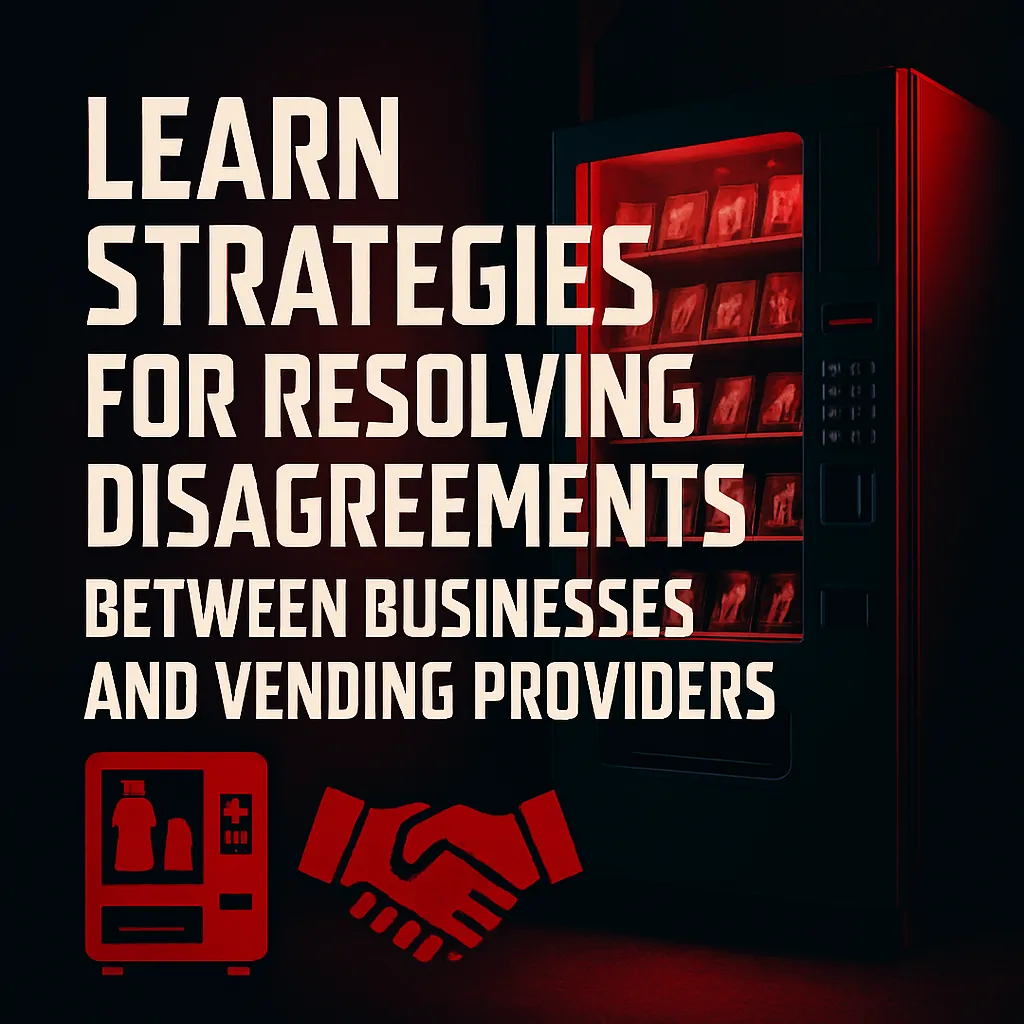Resolving Vending Contract Disputes
Learn strategies for resolving disagreements between businesses and vending providers.
Back to Vending Contracts ResourcesLearn strategies for resolving disagreements between businesses and vending providers.
Back to Vending Contracts ResourcesEven with carefully planned contracts, disputes can arise. Understanding common issues and having a clear process for resolution can save time and maintain positive business relationships.
![]() Identify and document the core issue quickly
Identify and document the core issue quickly
![]() Reference the original contract for terms and conditions
Reference the original contract for terms and conditions
![]() Seek constructive communication for mutual understanding
Seek constructive communication for mutual understanding

Entering into a vending contract establishes a clear understanding between a business and its vending service provider. However, even the most detailed agreements can sometimes lead to misunderstandings or performance issues. Resolving vending contract disputes efficiently is key to maintaining a smooth operation and preserving good business relationships.
Disputes often stem from a few common areas: service level deficiencies (e.g., inconsistent restocking, machine malfunctions), financial disagreements (e.g., commission payout issues, unexpected charges), or misunderstandings of contract terms. The first step in effective resolution is to clearly identify the specific issue and gather all relevant documentation, including copies of the signed agreement and any prior communications. Understanding the details of your service agreement is crucial; a good read through sections like common clauses in vending contracts can shed light on expected procedures.
Once an issue is identified, formally documenting it and communicating directly with the vending provider is essential. A written record of discrepancies or concerns provides a clear timeline and evidence should the dispute escalate. Often, a direct conversation can clarify misunderstandings and prompt a swift resolution without further action. Many problems can be mitigated early by referring back to the original agreement. Knowing how understanding vending service contracts can help you navigate these discussions is invaluable.
If direct communication and negotiation do not resolve the dispute, other avenues can be explored. Mediation, involving a neutral third party to facilitate discussions, can help bridge communication gaps and find common ground. For more serious breaches or persistent issues, professional advice regarding early termination of vending contracts may be necessary. This should always be considered a last resort, as it can involve potential costs and disruptions.
The best way to resolve disputes is to prevent them. This involves choosing a reputable vending provider, thoroughly reviewing and understanding all contract terms before signing, and maintaining open lines of communication. Regular performance reviews and feedback sessions can address minor issues before they grow into major conflicts. A well-managed contract, proactive problem-solving, and clear expectations minimize the likelihood of costly and time-consuming disagreements.
A vending contract dispute arises when there's a disagreement between a business and a vending service provider regarding the terms, performance, or obligations outlined in their vending service agreement.
Common causes include issues with machine malfunction, inconsistent restocking, product quality, payment discrepancies, communication breakdowns, or disagreements over contract termination clauses.
The first step is usually to formally document the issue and communicate directly with the vending service provider to seek an amicable resolution through discussion and negotiation.
Clear and documented communication is crucial. It helps both parties understand the nature of the dispute, their respective positions, and facilitates finding a mutually agreeable solution.
The original contract is the foundational document. It defines the terms, responsibilities, and dispute resolution mechanisms, acting as the primary reference point for both parties.
Early termination may be considered if fundamental contract breaches occur, or if all attempts at resolution fail, especially if the contract includes specific termination clauses for such scenarios.
Yes, alternatives include direct negotiation, mediation (a neutral third party facilitates discussion), or arbitration (a neutral third party makes a binding decision).
Prevention involves clear, comprehensive contracts, regular performance reviews, proactive communication, and promptly addressing minor issues before they escalate.
Keep copies of the signed contract, all correspondence (emails, letters), service logs, performance reports, invoices, and any records of machine issues or downtime.
Legal counsel may be advisable if the dispute is complex, involves significant financial value, or if initial attempts at resolution have failed, especially concerning contract interpretation or breach.